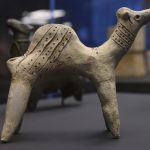
New Arts & Culture tool Fabricius uses machine learning to translate 4,000-year-old symbols.
It’s been 221 years since the discovery of the Rosetta Stone—a key tool for deciphering Egyptian hieroglyphs. To celebrate the anniversary, Google this week launched Fabricius, a new Arts & Culture tool that lets anyone play classical linguist. The feature uses machine learning to translate 4,000-year-old symbols into modern language via three “dedicated gateways:” learn, play, work.
Get started with a short course on the history of hieroglyphs, the writing system used by the ancient North African civilization. Try your hand at tracing, drawing, and identifying different symbols, each of which is instantly compared to more than 800 unique glyphs using Google’s machine learning platform Cloud Auto ML. Once you have an understanding of hieroglyphs—the ancient Egyptian equivalent of emojis—you can translate your own words and phrases into coded messages to share with friends and family.
This tool is more than just a fun way to master hieroglyphs, though; it also offers new avenues for academic research. For decades, experts had to manually search through books to translate and decipher the ancient language—a process, according to Arts & Culture Program Manager Chance Coughenour, that has “remained virtually unchanged for over a century.”
Enter Fabricius: the first digital tool that decodes Egyptian hieroglyphs built on machine learning. It’s being made available as open source “to support further developments in the study of ancient languages,” Coughenour wrote in a blog announcement. “In the past you would need a team of data scientists, a lot of code, and plenty of time,” he continued. “Now AutoML Vision allows developers to easily train a machine to recognize all kinds of objects.”
Available in English and Arabic, Fabricius is named after George Fabricius, considered the father of epigraphy (the study of ancient inscriptions), and was created in collaboration with the Australian Center for Egyptology at Macquarie University, Psycle Interactive, Ubisoft, and a team of global Egyptologists.
from: pcmag
BY STEPHANIE MLOT 16 JUL 2020














